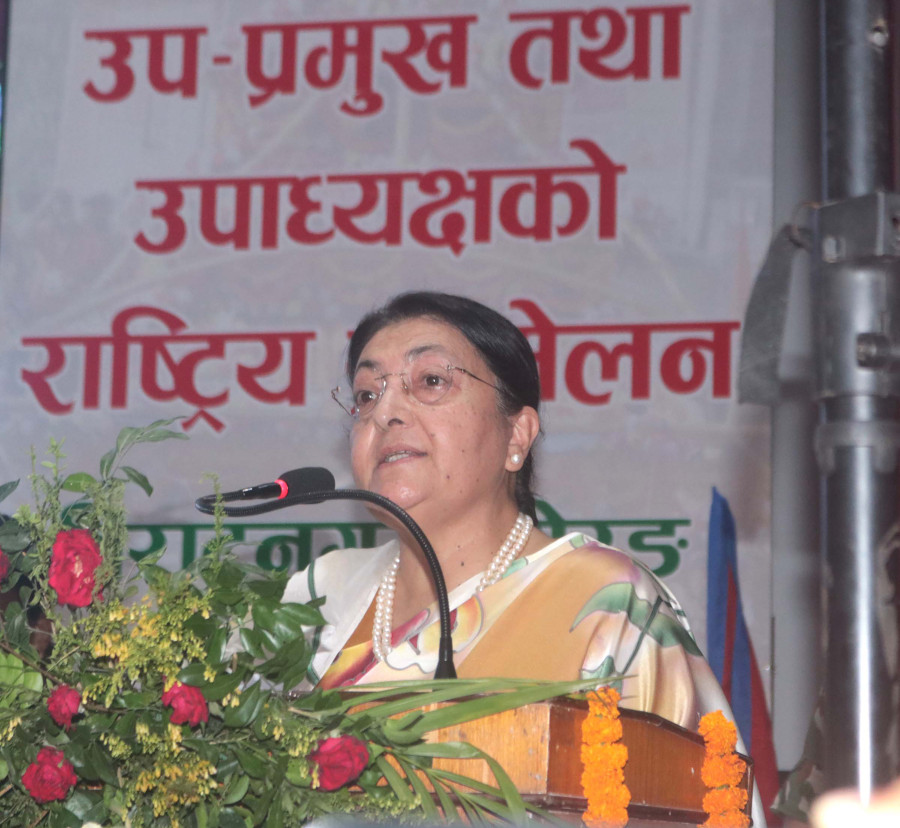Politics
Ex-President’s cadre meetings become headache for Oli
Back from her 10-day China visit, she visited Oli’s home district, apparently to feel the UML members’ pulse.
Purushottam Poudel
A few days after returning from a ten-day visit to the northern neighbour, China, former President Bidya Devi Bhandari travelled to Jhapa to attend a national-level programme of deputy mayors and vice-chairpersons of local governments in Koshi Province.
She also attended a science exhibit organised by Jhapa’s high school students. Former President Bhandari, having completed her trip north in her capacity as a leader of the CPN-UML, immediately travelled to Jhapa—the home district of UML chair and Prime Minister KP Sharma Oli.
“Bhandari’s movements are aimed at gauging her acceptability should she decide to rejoin active party politics,” said a UML leader close to Bhandari.
A number of party leaders are lobbying for Bhandari’s return to active politics. Although Bhandari has not clarified her stance, she has dropped plenty of hints that she will, sooner or later, return to politics. Bhandari was an elected vice-chair of the UML before she became the country’s President in 2015.
She had visited China from May 24 to June 2 leading a delegation of UML leaders including Industry Minister Damodar Bhandari, to attend the fourth edition of the Global Civilisation Initiative.
Before visiting China, she toured provinces such as Gandaki, Koshi, and Lumbini, where she held political meetings.
A group of leaders that includes Standing Committee and politburo members who previously backed Oli but are now dissatisfied with him—such as Karna Thapa, Gokul Baskota, Krishna Rai, Binod Dhakal, and Krishna Dahal—have openly backed Bhandari’s return to active UML politics, and even take up party leadership.
When some party leaders lobby for Bhandari as their potential leader, China also tried to engage her as a possible head of the UML as Beijing believes she is someone it can trust, said Rupak Sapkota, a China analyst who was also a foreign policy adviser to former prime minister and CPN (Maoist Centre) Chairman Pushpa Kamal Dahal.
“China tried to engage Bhandari after her name surfaced as a potential leader of the party,” Sapkota said.
Prime Minister and UML chair Oli has repeatedly expressed his discontent over the interest of fellow party leaders and neighbouring countries in Bhandari. He expressed his irritation during the 24th general convention of the All Nepal National Free Student Union (ANNFSU) earlier this week.
While addressing the ANNFSU convention, Oli appeared to direct some comments at her.
“There’s another game being played now. Someone is entering the scene.” Oli said, which the political experts claim is directed at former President Bhandari.
When journalists asked former President Bhandari about Oli’s comment, she dismissed the question.
“I do not think the statement of the UML chair and Prime Minister Oli was directed at me,” Bhandari told journalists.
When the media asked her about the party chair’s concern about not informing the party about the provincial tour, Bhandari said, “I am someone who has already served the nation as its President. Even in terms of party affiliation, I have been working with it since I formally joined as a member.”
She further explained: “I have wide recognition and am acquainted with various sectors of society. From that perspective, I do not need permission from CPN-UML committees or leaders to travel in the country.”
Bishal Bhattarai, a politburo member, also claims that the issue between party chair Oli and former President Bhadari has been blown out of proportion. Bhattarai, who is close to Oli, argued that the ex-President’s answer to the journalists should not be seen as a sign of displeasure with the party leadership.
“Unlike what is claimed, there are no rifts in the party,” Bhattarai said. “Should the former President return to party politics, she would do so with consensus in the party.”
Other political analysts differ.
“Oli’s remarks at the ANNFSU general convention and Bhandari’s reply are both unusual,” said Krishna Pokhrel, a professor of political science. “Perhaps all is not well between Oli and Bhandari.”
Some UML leaders have also started questioning the approach of party chair Oli. They argue the party currently needs a unifying figure rather than someone like Oli who tends to rub a lot of people the wrong way.
They argue that Bhandari’s soft-spoken nature and empathy is well suited for the times, given the lack of trust among current UML leaders.
“Former President Bhandari does not need the support of any neighbouring country to assume UML leadership, nor should the party’s leadership be picked like that,” a UML leader said. “She is capable of taking the leadership in her own right.”
For Professor Pokhrel, the way China treated Bhandari during her 10-day tour could have boosted her morale.
However, UML leader Karna Thapa, one of Bhandari’s close aides, refutes such speculations.
“It would be wrong to say her confidence has been boosted after a visit to the northern neighbour,” Thapa said. “She is not so weak as to need outside support to secure her rightful place in the party.”
Some UML leaders even argue that Oli and Bhandari shared the same political stature before she became the head of state.
But leftist political analyst Hari Roka says while Bhandari played a role in Oli's political rise within the UML, it does not imply that they had equal strength.
Roka recalls that Bhandari was a dutiful housewife until the death in 1993 of her husband Madan Bhandari, then general secretary of the UML. “She rejoined politics after Madan Bhandari’s death. By that time, Oli was already a shrewd political operative,” Roka said. “It would be wrong to compare Oli and Bhandari and say they had equal powers in the UML.”
After his death, the Madan Bhandari Foundation was instituted, with funds put together from various internal and external donors.
Oli mobilised most of those funds, which helped him build a strong cadre-base of loyalists, thus expanding his influence, Roka added.




 10.12°C Kathmandu
10.12°C Kathmandu















